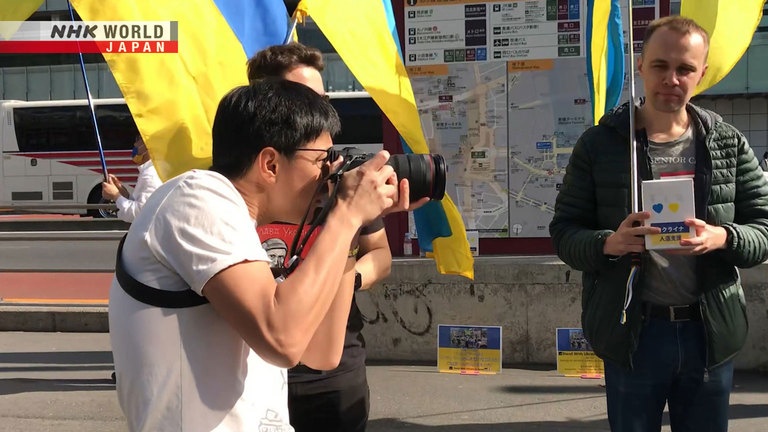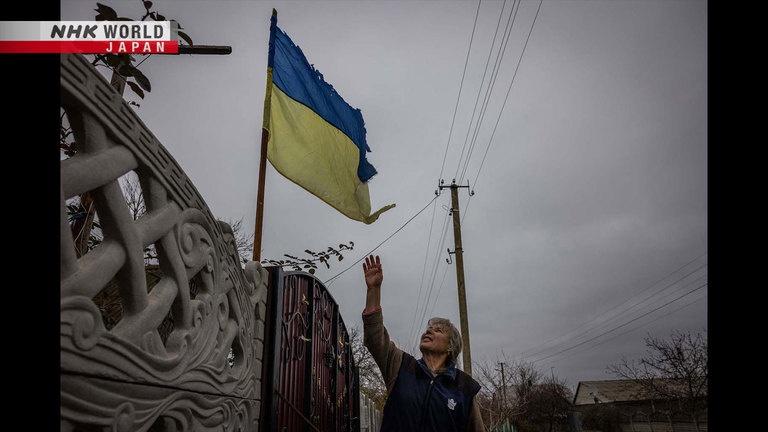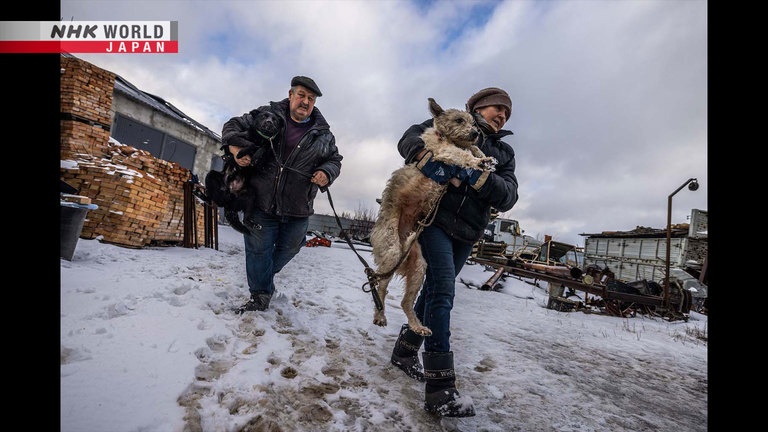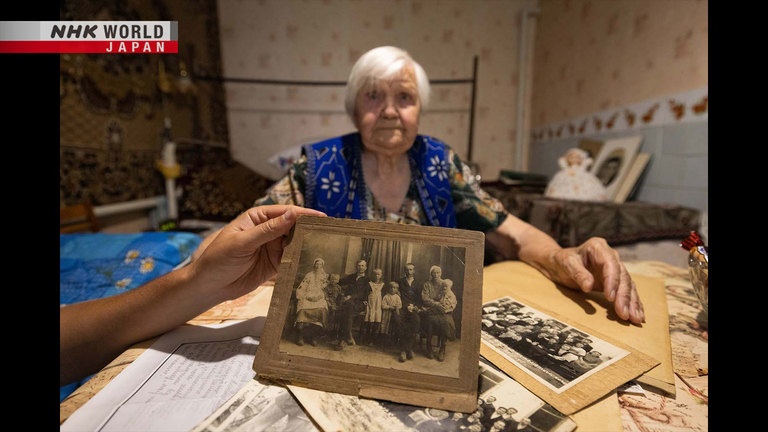A Hong Kong Photojournalist in Ukraine: Kure Kaoru / Photographer & Journalist
We feature Kure Kaoru, a Hong Kong photographer who experienced the democracy movement. Now, in Ukraine, he is photographing local people and addressing the threat of authoritarianism to the world.




Transcript
Direct Talk
The Russian invasion of Ukraine continues.
Each day, gunfire cracks through
streets or across fields.
One photographer documents the daily lives
of people living in these war zones
to show the world
what is happening on the ground.
Kure Kaoru originally hails from Hong Kong.
Kure Kaoru
Photographer
I wish
I could bring the message from Ukraine
that this can happen to any country anytime.
This is one of the biggest things
that I would like to
tell people about.
Why is someone from Hong Kong
so riveted by the war in Ukraine?
A Hong Kong Photojournalist in Ukraine
Kure Kaoru has been photographing Ukraine
since before the Russian invasion.
He has snapped thousands of photos
that reveal the suffering
and strength of ordinary people
as they struggle to survive
under the fire of war.
This photo was taken in last November
in a village in Mykolaiv province
after it was liberated
from Russian military rule.
This one I really like.
She was a woman in the village, Nova Petrica.
So the village was liberated
for three days and we went there,
and she was putting up this flag.
You see that, like this blue part of the flag
is actually eaten by the mouse
during this eight months of occupation.
Once a village of 2,000 people,
today just 300 remain.
So there were a lot of casualties
in this village as well.
So, but you can see that people are still
smiling when the villages are liberated.
Elico-Polo / PIXTA
Donetsk
October 2022
Smiling here is Sasha, a shepherd.
Kure met him in Donetsk province
in southeast Ukraine.
It is a tranquil, pastoral scene,
but Sasha too is a victim of the invasion.
This was a very memorial man,
lives near Yampil.
During the start of occupation,
this man's named Sasha,
his son Taras came back to see his father
during the start of the occupation
and son went out bringing these sheep around
and never came back.
So Sasha went out looking for his son
and after two months he saw his rotting body
in one of the Russian trenches.
So this is a very sad life
in the frontline areas,
like you can always randomly die at any time.
Kure met this couple
in February 2023 in Bakhmut,
a fierce battleground in the east.
Elico-Polo / PIXTA
Bakhmut
February 2023
They were rescuing dogs
left behind by their owners.
During that evacuation,
a lot of dogs get left behind.
So this couple actually had a dog shelter
and their housing a lot of dogs
who were wandering around
the streets of Bakhmut.
So this day we went in from with some
German volunteers, trying and save these dog.
We also tried to persuade these two person
to come with us to safety as well,
but they insisted to stay in Bakhmut
just to help these dogs,
so I hope they are fine now.
Bakhmut
February 2023
This shot, also from Bakhmut,
depicts a woman who continues to live
in her hometown despite continued bombing.
She is focused on a single rose she received.
This is also an interesting story.
This is one of the
volunteer center of Bakhmut.
This day is a one of the last days
that volunteer could actually go in, but
in additional to bringing food,
they also bring roses and
the reason behind that is to
cheer up the local population that are
still hiding at the basements
and not willing to go away.
And they were bringing roses
to remind them of a normal life
and persuading them finally agree
to come out of the city being bombed.
Through the Ukrainians he meets,
Kure is confronted with
a history of Russian oppression
dating back to the days
of the former Soviet Union.
One elderly woman he met in Cherkasy province
is a living witness to Ukraine's violent past.
Elico-Polo / PIXTA
Cherkasy
November 2022
She took out an old family photo
and began to tell a story.
So this one's Anna.
When we met Anna, she was 96 years old
and she's one of the survivors
of the Holodomor.
And during 1932–1933
there was a big starving event
called the Holodomor in Ukraine.
It was orchestrated by the Soviet Union
in order to kill off a lot of Ukrainian people,
because they were deemed to be a problem.
The Stalinist regime of the time
is said to have forcibly
confiscated food from rural villages.
Millions of people starved to death,
including Anna's family.
At this time, the Ukrainians
wasn't really picking up a gun
to fight back against the Soviets.
But we, this is how we learn that
not picking up a gun is not equal to peace.
I mean, people still die
even if you do not fight.
Taking photos on the front lines,
Kure learned first-hand
why Ukrainians choose to fight back.
So throughout my days in Ukraine,
well of course as a frontline journalist
we sometimes go to the frontline
and shoot tanks and like
soldiers and stuff.
But we would also, because I basically
reside in Ukraine at the moment
and we hear a lot of
local Ukrainian people talking,
sharing their thoughts.
I would like to get as much as close
to the normal people of Ukraine as possible.
I'm trying to show
the spirits of the Ukrainian people.
That why they're fighting,
why do they need to fight?
And I think this is one of the emphasis
for me during my days in Ukraine.
Kure Kaoru was born in Hong Kong in 1986.
After graduating high school,
he went on to Imperial College London,
where he majored in genetic informatics.
This is when he picked up photography.
I've always liked photography.
It was my hobby, and I also work with
some television channels.
As my side job during my PhD times
and I took a lot of pictures.
The escalating protests in Hong Kong in 2019
were a turning point for Kure,
and he changed career paths.
Many Hongkongers objected to
a proposed ordinance amendment
that would allow the Chinese government
to intervene in Hong Kong.
This grew into a major democracy movement.
A lot of people started
taking interest in politics,
and this led to a police break.
This led to a police crackdown,
and a lot of protests,
and a lot of people got hurt.
A lot of people got tear gassed.
And even some people disappeared.
But for me, this was not right.
I mean, I wasn't very active
in the protest per se, but I would like to.
I wanted to tell the world
what was going on in my home country.
Kure began working as a local reporter
for a Japanese media outlet
that he already had a relationship with.
Meanwhile, police pressure
was escalating daily,
and journalists were being pursued.
The police were trying to make me confess
that I'm a fake journalist.
Which was outrageous.
I mean, a lot of journalists
have this kind of experience
and get beaten up a little bit.
I wasn't beating up too badly, but I was.
We have the rights to take pictures and
report on whatever is going on in our city.
However, the police suppressed
the pro-democracy movement,
and many of those seeking
freedom of speech left Hong Kong.
Kure moved to London, where he had studied,
and decided to become a journalist.
London, England
I'm good at shooting photos.
I'm good at
writing stories.
I'm good at listening to what people say,
so I just thought that
this is the thing that I have to do.
His next step as a journalist
was the Belarusian
presidential election in August 2020.
There, a democratic movement
against the dictatorship was in full swing.
Kure headed to the capital, Minsk,
and began photographing events.
Well basically
Belarusian people were very angry
and they kept doing this protest in Minsk
that had a very, a lot in common
with the Hong Kong protests.
And a lot of people in Hong Kong,
for that reason,
were interested in the news happening.
So as I had my experience in Europe,
I thought it was my place
to report something from outside Hong Kong.
Kure was influenced
by the foreign journalists
who covered the democracy movement
in Hong Kong.
During the Hong Kong protests, a lot of
foreign journalists came to Hong Kong, and
it wasn't exactly safe for them either.
So, but they managed to stay
in our city and brought our news out
to the international community,
did their best.
I mean we have had our share of
journalism in Hong Kong,
and I'm really grateful for that.
Kure entered Ukraine in February 2022,
one week before Russia invaded.
People were anticipating a war.
I mean, at least the foreign media
were anticipating a war
to start sometime around
the end of the Olympic Games.
So I took I'm one of the last people
who took a flight into Ukraine
because the airport was closed shortly after.
Kure shot this three months
after he first arrived in the country.
Elico-Polo / PIXTA
Luhansk
May 2022
During the interview, a Russian shell
detonated only five meters away.
Kure's local guide was seriously injured
in his right shoulder.
Why would anyone continue to risk their life
reporting in the Ukrainian war zone?
I mean this dualistic view
of totalitarianism versus liberty
versus democracy is one side of the story.
But like, this is not
the only side of the story,
and the Ukrainians have not had their country
since the Mongolians invaded Kiev.
Ukrainians have been at the mercy of
powerful neighbors since the 13th century.
After the collapse of the Soviet Union,
they finally regained control
of their own country.
They have been able to keep their identity
as Ukrainians, as Cossacks, as Ukrainians.
In Hong Kong,
we have a relatively shorter history,
but we also have our own spoken language,
which is different from
bigger regions around us.
I think there are a lot of things to learn
from the Ukrainians as a Hongkonger.
This is why I decided to come to Ukraine,
because some country
is being invaded by a bigger neighbor.
While he lives in Ukraine,
Kure visits Japan to hold photo exhibitions,
appear on news programs,
and disseminate information about Ukraine.
Somewhere in Europe, somewhere in the world
that people are fighting for their democracy.
A lot of Ukrainians are saying that
they have to pick up weapons and fights,
because this is for their existence.
This is for their language, their culture.
Once the invasion is over, Kure hopes to
realize his dream of becoming a scientist.
In anticipation of that day,
he has this message for the world.
Do not forget about Ukraine.
I would like to remind the world
that the war is still going on and
a lot of people are dying,
a lot of people are fighting.
In order for this to have an end,
everyone has to contribute.
And please do continue
your support for Ukraine.
Do not forget about Ukraine.